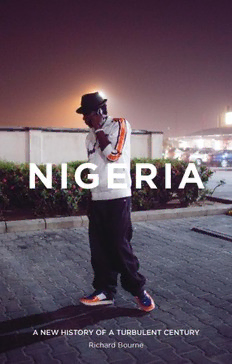
Nigeria: a new history of a turbulent century PDF
Preview Nigeria: a new history of a turbulent century
More praise for Nigeria: A New History of a Turbulent Century ‘This book is a major achievement and I defy anyone who reads it not to learn from it and gain greater understanding of the nature and development of a major African nation.’ Lalage Bown, professor emeritus, Glasgow University ‘Richard Bourne’s meticulously researched book is a major addition to Nigerian history.’ Guy Arnold, author of Africa: A Modern History ‘This is a charming read that will educate the general reader, while allowing specialists additional insights to build upon. It deserves an audience far beyond the confines of Nigerian studies.’ Toyin Falola, African Studies Association and the University of Texas at Austin About the author Richard Bourne is senior research fellow at the Institute of Commonwealth Studies, University of London and a trustee of the Ramphal Institute, London. He is a former journalist, active in Common wealth affairs since 1982 when he became deputy director of the Commonwealth Institute, Kensington, and was the first director of the non-governmental Commonwealth Human Rights Initiative. He has written and edited eleven books and numerous reports. As a journalist he was education correspondent of The Guardian, assistant editor of New Society, and deputy editor of the London Evening Standard. Also by Richard Bourne and available from Zed Books: Catastrophe: What Went Wrong in Zimbabwe? Lula of Brazil Nigeria A New History of a Turbulent Century Richard Bourne Zed Books LONDON Nigeria: A New History of a Turbulent Century was first published in 2015 by Zed Books Ltd, The Foundry, 17 Oval Way, London SE11 5RR, UK www.zedbooks.co.uk Copyright © Richard Bourne 2015 The right of Richard Bourne to be identified as the author of this work has been asserted by him in accordance with the Copyright, Designs and Patents Act, 1988 Typeset by seagulls.net Index: Terry Barringer Cover design: www.burgessandbeech.co.uk All rights reserved. No part of this publication may be reproduced, stored in a retrieval system or transmitted in any form or by any means, electronic, mechanical, photocopying or otherwise, without the prior permission of Zed Books Ltd. A catalogue record for this book is available from the British Library ISBN 978-1-78032-907-9 hb ISBN 978-1-78032-906-2 pb ISBN 978-1-78032-908-6 pdf ISBN 978-1-78032-909-3 epub ISBN 978-1-78032-910-9 mobi In memory of the late Beko Ransome-Kuti, human rights campaigner, and for my daughter Camilla, who met him, and my youngest grandchild, Ollie, who never had the chance. Contents Preface ix Timeline xiii Acronyms and abbreviations xx Map of Nigeria xxiii Section 1: 1914–39: Invention of a country 1 1. A merger makes a large possession for Britain 3 2. First World War: Nigeria on the front line 16 3. Lugard struggles with opponents 26 4. Between the wars: Nigeria is not a single state 32 5. Between the wars: the economy in a world depression 39 6. Between the wars: a new assertive nationalism 43 Section 2: 1939–64: Rocky road to freedom 55 7. Another world war and strategic importance 57 8. Political change and divisive regionalism 69 9. Regional governments and the coming of independence 78 10. The joy of independence 88 11. Overture to disaster 96 Section 3: 1964–89: The shadow of the generals 109 12. Military coups, Biafra and civil war 111 13. Reconstruction, another coup and the craving for 130 democracy 14. A second republic, its short, inglorious life and its 142 overthrow 15. Buhari, IBB and a new military era 157 Section 4: 1989–2014: A decade of pain, then disappointment in democracy 173 16. The annulment of an election puts Nigeria on edge 175 17. The disastrous Abacha years 189 18. Democracy, and the return of Obasanjo 201 19. Yar’Adua, Jonathan and threats in the Delta and 224 the northeast Section 5: Reflections 241 Politics as business 245 Ethnicity and religion 250 Oil, inequity and poverty 258 One Nigeria? 265 Afterword 271 Notes 276 Bibliography 299 Index 309 Preface A nyone who claims to understand Nigeria is either deluded, or a liar. It comprises so many ethnicities and perspectives, with a contested past and statistics to be taken with pinches of salt, that it is an act of immodesty to write a centenary history. My justification is that I like the country, have been befriended by many Nigerians, and want readers to appreciate the gigantic nature of Nigeria’s challenges and achievements. To create a single state, to which all citizens can owe allegiance and in which all may prosper, is an ongoing struggle. The intention here is to elucidate, as fairly and readably as possible, a story that began with a colonial merger and bring it up to date. Nation-building is a requisite everywhere, and it was particularly difficult in newly independent states as the tide of European empires receded in the second half of the twentieth century. For Nigeria an existential question about the unity of this diverse polity has never quite disappeared. My purpose in tracing this story is to see how this manufactured state has, on the contrary, managed to survive. My personal acquaintance began in 1981–2, when I was commiss- ioned by Channel 4 – then an experimental TV station that went on the air in London at the end of 1982 – to see whether it was possible to run a weekly news-feature programme with the working title Third World Week. It would, for example, use material from African TV stations and African filmmakers, and I travelled round the continent over a month to report on the idea’s viability. However, I had difficulty in getting a Nigerian visa because I was not long in any capital, and
